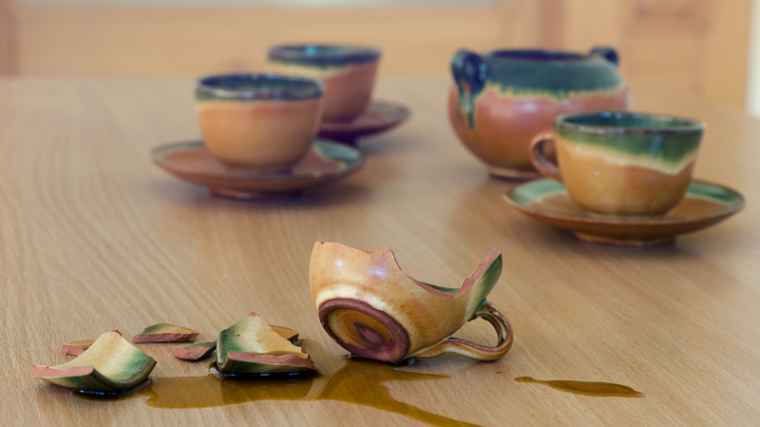Blue Cliff Record, Case 46
“Ching Ch’ing asked a monk, “What is that sound outside the gate?” The monk said, “The sound of raindrops.”
Ch’ing said, “Sentient beings are inverted. They lose themselves and follow after things.”
The monk said, “What about you, Teacher?”
Ch’ing said, “I almost don’t lose myself.”
The monk said, “What is the meaning of ‘I almost don’t lose myself.’”
Ch’ing said, “Though it still should be easy to express oneself, to say the whole thing has to be difficult.”
To me, this is one of the most tender and heartfelt exchanges in all of the koans I’ve encountered.
Those of you who have been around Treetop for a while will be familiar with the exhortation to become your koan – every part of it. To understand what this koan has to offer, then, we must become Ching Ch’ing. We must become the anonymous monk. We must become the rain.
If someone in the koan is asking a question, one of the first things I want to understand is what prompted question. If the person asking is a student, is the question coming from ignorance? Is it coming from a deep sense of spiritual disquiet – from the edge of some breakthrough not yet realized? Or is it coming from a desire to show off or to show someone else up? Any combination of these is possible.
When the asker of the question is a teacher, though, as it is in this case, I tend to see the question less as a question than as an invitation. It’s the invitation all teachers, since Shakyamuni Buddha, have extended to all students: the invitation to wake up and to experience our True Nature.
Ching Ch’ing, who taught in 10th Century China, was fond of extending this particular invitation to his students.
The commentary accompanying this koan in the Blue Cliff Record notes that, on another occasion, Ching Ch’ing asked a monk, “What is that sound outside the gate?”
The monk said, “The sound of quail.”
Ch’ing said, “If you wish to avoid uninterrupted hell, don’t slander the Wheel of the True Dharma of the Tathagata.”
Another time Ch’ing asked, “What is that sound outside the gate?”
A monk said, “The sound of a snake eating a frog.”
Ch’ing said, “I knew that sentient beings suffer: here is another suffering sentient being.”
In each of these exchanges, the monks declined Ch’ing’s invitation. In naming the various sounds outside the gate, they left the world there, outside the gate.
We do this, too, whenever we fail to experience the non-separation of self and other, whenever we carve the world up into me and not me. Sacred and profane. Us and them.
It’s natural to want to hide out, safely behind these gates we’ve constructed. To do otherwise is to be vulnerable, to risk pain. The pain of the frog in the mouth of the snake. The pain of bitter political partisans, trying desperately to legislate away change and impermanence. The pain of addiction, homelessness, war. The pain of loss.
And so we insulate ourselves from reality by constructing walls made from our habitual reactions of clinging and aversion.
Consider the rain of this case. We know rain is necessary for all life on Earth, and yet, rain is much maligned in our metaphoric imagination, synonymous with darkness and despair.
Rather than plumb those depths, the depths of our precious human existence, too often we find ourselves intoning, like Little Orphan Annie, that “the sun’ll come out tomorrow,” and pining for that brighter future.
Forever looking for an out, a plan B, we miss out on what’s right in front of us, forgetting that this is where our lives take place.
Zen practice offers us another mode of being, though. It’s what Dogen Zenji, the Japanese founder of our Soto tradition, was pointing to when he wrote a poem on this very case:
Because the mind is free –
Listening to the rain
Dripping from the eaves,
The drops become
One with me.
When the mind is free, our gates fling wide open and the rainwater comes rushing through the halls. The boundaries between us and our experience, between us and “them,” dissolve and true intimacy, true compassion, is possible.
But our monk – like so many monks in so many koans, and like us so much of the time – would rather stay put, safely inside the gates of his constructed and ordered sense of self.
And so Ch’ing gently chides him, “Sentient beings are inverted. They lose themselves and follow after things.”
As we’ve been learning in our discussion group on the Buddha’s Four Noble Truths this year, this following after things is the cause of our deepest suffering. Like the hungry ghosts of Buddhist mythology, we spend our lives in a state of insatiable craving. We long desperately for something, anything, to satisfy us, always telling ourselves that the next thing on our list will do it, will be THE thing that will finally make us whole.
All we need is the right college, the right job, the right spouse, the right children, the right car, the right house, the right diet or exercise plan, the right self help book … Or maybe just the next drink, the next high …
But, of course, none of these things ever satisfy us for long. As the comedian George Carlin once observed, “Trying to be happy by accumulating possessions is like trying to satisfy hunger by taping sandwiches all over your body.” It doesn’t work.
And so we lose ourselves, over and over again, chasing after one object of desire after another, bankrupting our lives, exploiting one another, and destroying our planet in the process.
Even Zen practice usually starts this way, from a materialistic motivation. Most of us enter this path viewing it as one more self-help regimen. We start meditating thinking it will make use calmer, less scattered, more serene, more creative, able to concentrate better. Maybe we think it will make us kinder, more patient, a better lover or a better parent. Or perhaps we read some Zen book, like “The Three Pillars of Zen,” and we’re looking for a dramatic spiritual experience, for a kensho, or for enlightenment itself.
This is natural, and nothing to be ashamed of, but we must eventually outgrow this gain-seeking mind if we are ever to mature in this practice. If we don’t, one day we will realize those blissed out experiences we have on the cushion, like everything in the Universe, are impermanent. We may rise from our zafus feeling light and ethereal, convinced that we have finally tapped into our inner Bodhisattvas …
… And that feeling will last precisely until we get into our cars and some asshole cuts us off. Or until our spouses do that thing we’ve told them about … how many times now? Or maybe until we turn on the TV or log onto the computer and see some talking head ignorantly jabbering away about some issue near and dear to our hearts.
And just as quickly as that, we’re cast out of the realm of the Heavenly Beings. Which is just as well. The Buddha taught that the human realm is the only plane where liberation is possible.
That’s just what happens. If, instead of viewing our volatile human nature as the very ground of our awakening, the very place where practice happens, we view it a something to be transcended, discarded, we’re in for disappointment.
Or, even worse, we might delude ourselves into thinking that we have, somehow, transcended our human nature. Then we invariably begin to wield our supposed enlightenment as a club to keep all of those lesser beings in their place. Instead of freeing us, this pseudo awakening only reinforces our sense of a solid, separate, special self.
Which is why the last section of this koan is so important.
When the monk asks Ch’ing, “What about you, teacher?” I think he’s really asking, “What about me?”
Is there any hope for me? Am I doomed to spend my whole life following after things? I came to this monastery seeking enlightenment, and you keep telling me to go deeper. When will I finally hit bedrock? You’re enlightened, aren’t you? It’s possible for me, right?
And Ch’ing’s reply is the most raw, honest, and merciful answer imaginable. He doesn’t obscure the issue with poetry. He doesn’t shout or hit or engage in any of what our late teacher Stef would call “Zen crapola.”
He meets the monk where he is, in his doubt and frailty, and he flings open his own temple gates and bares his humanity.
“I almost don’t lose myself.”
Our teacher, Peter, once recounted to me the story of a man he knew who practiced Zen very diligently for a few years, attending every sesshin, and staying up long into the night, always pushing for a major breakthrough. When he finally had a kensho experience confirmed by a teacher, he walked away from practice. He’d gotten what he came for. His flicker of awakening was like a certificate he could put on his wall. Enlightenment reduced to just one more entry on someone’s bucket list.
But that is not our way.
Earlier, I mentioned Dogen, the Japanese founder of our tradition. Like many of the great Zen teachers of antiquity, Dogen, as a young monk, was consumed with a burning question. Having heard the Mahayana teaching that we are all intrinsically Buddha, Dogen wanted to know what, then, was the point of practice. A fair question for a monk. If I’m already enlightened, why should I submit to all of this endless sitting in a freezing monastery where the food is bad and there are no pretty girls?
Dogen obsessed over this question for years. No one in Japan could answer it for him, so he famously packed up his question and his meager possessions and went to China, the birthplace of Zen, to find someone who could.
After years of travel, Dogen eventually befriended a wise old monk who impressed him deeply. As it turned out, this monk wasn’t the abbot of some important temple, but the tenzo, the cook. It was through his friendship with this tenzo, who gave his wholehearted attention to every morsel of food that entered his kitchen, rinsing every grain of rice “as if they were his own eyes,” that Dogen finally realized the answer to his question.
We don’t practice to become Buddhas – to overcome our humanity. Rather our practice is the expression of our Buddha Nature.
As such, the idea of endless practice is a cornerstone of Soto Zen. Throughout the rest of his life, Dogen continuously taught that practice and awakening are Not Two.
There is no last word in Zen. There’s no hocus pocus fix for our humanity.
Rather, we dedicate ourselves to endless practice, to finding awakening right here within our human frailty. And as simple as that may sound, Ch’ing’s closing statement in this case reminds us that to say the whole thing has to be difficult.
After all, life is difficult. Sometimes it rains.
But if we devote ourselves to endless practice in this way, then, like the 20th Century poet and monk Santoka, we can say, “Just as it is. It rains. I get wet. I walk.”
“Ching Ch’ing asked a monk, “What is that sound outside the gate?” The monk said, “The sound of raindrops.”
Ch’ing said, “Sentient beings are inverted. They lose themselves and follow after things.”
The monk said, “What about you, Teacher?”
Ch’ing said, “I almost don’t lose myself.”
The monk said, “What is the meaning of ‘I almost don’t lose myself.’”
Ch’ing said, “Though it still should be easy to express oneself, to say the whole thing has to be difficult.”



